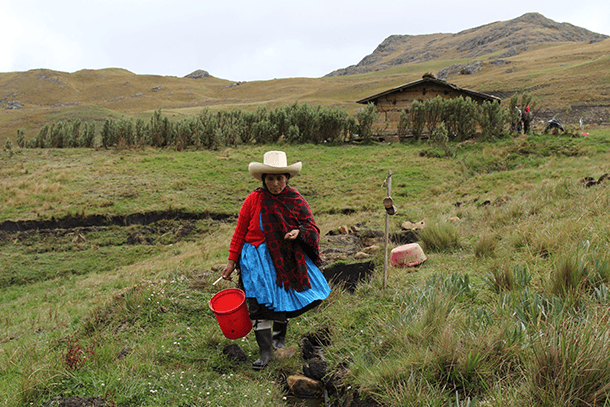Violence, death threats confront latest winner of prestigious environmental prize
Máxima Acuña on her farm in the highlands of Peru
Máxima Acuña fought a proposed gold mine on her farm. For that, she went to jail, had her house knocked down, her potato crop destroyed and faces death threats. But her bravery and determination have also earned her the 2016 Goldman Environmental Prize for Central and South America.
The Goldman awards are perhaps the most prestigious environmental prizes in the world. They are presented annually to six environmental activists from around the world who “demonstrate exceptional courage and commitment, often working at great risk to protect our environment.”
Acuña is an indigenous farmer from the Cajamarca highlands of Peru, near one of the largest open-pit copper and gold mines in the world, run by Peru’s Buenaventura and Colorado-based Newmont mining companies. In 2010, the companies tried to build a new mine 10 miles away, right in Maxima’s backyard. The project would have destroyed four mountain lakes, but Maxima stood in the way, refusing to leave her land.
In 2011, armed men arrived, destroyed her house, and brutally beat her. Then the mining company pressed charges against her for allegedly squatting on the 60 acres she bought legally in 1994. Acuña was sentenced to three years in prison. But she fought the conviction and eventually won her freedom and the right to return to her land, where she grows potatoes and raises guinea pigs, sheep and cows. The mine is now on hold, but Maxima continues to face threats of violence and harassment.
This year’s Goldman Prize ceremony, honoring Acuña and five others, began by remembering one of last year’s winners, Berta Cáceres of Honduras. Cáceres was murdered by gunmen in March. She won the Goldman Prize for her work resisting a series of dam developments that could have cut off her indigenous Lenca people from traditional access to safe water, food and medicine.
At the ceremony, Douglas Goldman, son of the prize’s founders, said Cáceres' death should be viewed as an assassination and her life an inspiration to all those fighting for justice.
“Berta was a gentle soul,” Goldman said. “However, when confronted with the wrongs being threatened upon her indigenous Lenca people of Honduras, she was a fiercely determined fighter for that which is right. For her outspoken stance in defense of her people she was subjected to numerous and constant death threats. On March 3, those threats became a reality.”
Goldman dedicated this year’s awards to Cáceres, and said he “retain[s] the hope that such outrageous, inhuman actions to unjustly stifle the defense of native peoples and their environments will once and for all cease.”
At the ceremony, Acuña said: “That is why I defend the land, I defend the water, because that is what life is for. I am not afraid of the power of these corporations. I will continue fighting. This is for those who have died in Celedin and Bambamarca, and those who continue to fight in Cajamarca.”
This article is based on a story that aired on PRI’s Living on Earth with Steve Curwood.
Every day, reporters and producers at The World are hard at work bringing you human-centered news from across the globe. But we can’t do it without you. We need your support to ensure we can continue this work for another year.
Make a gift today, and you’ll help us unlock a matching gift of $67,000!
